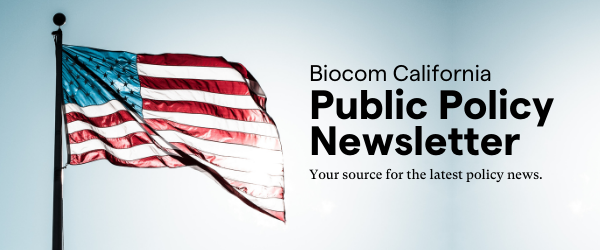|
“One Big Beautiful Bill Act” Signed Into Law; Biocom California Presents at PDUFA Meeting; AI Regulation Stays in Place; San Diego’s Newly Elected District 1 Supervisor; Rezoning Proposal in SF; Support for Future Pasadena Life Science Projects; and more.
|
“One Big Beautiful Bill Act” Impact on the Life Science Industry
On July 4, the president signed into law H.R. 1, the “One Big Beautiful Bill Act,” following narrow passage in both the Senate (51-50) and the House (218-214). The bill advanced through budget reconciliation, a powerful procedural tool that bypasses the Senate’s 60-vote threshold and allows the majority party to enact sweeping legislation with a simple majority. The package reflects weeks of negotiations and marks the Republican Party’s most significant opportunity to shape economic, tax and health care policy. Of note to the life science industry: It permanently restores companies’ ability to immediately deduct the full cost of domestic research and development, expands the IRA exemption from Medicare price negotiations to include orphan drugs that treat multiple rare diseases and raises the cap on state and local tax deductions from $10,000 to $40,000.
|
|
 |
|
|
|
Advocating for Our Members
|
|
Federal ► Biocom California Comments During PDUFA Public Meeting
- Our Regulatory Policy Manager, Zoe Bilis, provided comments during the FDA’s Public Meeting on the Reauthorization of the Prescription Drug User Fee Act (PDUFA). We also plan to submit our detailed comments to the public docket.
- Our comments focus on enhancements that include increased transparency and communication between the FDA and sponsors throughout the review process and additional resources and training that support a more consistent and predictable regulatory approach.
|
State ► Preserving Innovation in Artificial Intelligence Technology
- The U.S. Senate voted 99–1 to defeat a proposed 10-year moratorium on state artificial intelligence (AI) laws, preserving California’s ability to regulate AI technology. California currently has 20 AI laws with 30 more proposals before the Legislature, addressing issues ranging from deepfake videos to privacy protections and disclosure requirements.
- Biocom California will continue to monitor AI-related legislation to ensure our members can leverage AI technologies to advance life science innovation while navigating evolving compliance requirements.
|
San Diego ► Special Election Results for District 1 Supervisor
- Imperial Beach Mayor Paloma Aguirre secured enough votes to win the District 1 seat on the San Diego County Board of Supervisors, shifting the board’s balance back to Democrats. Aguirre pledged to tackle the region’s sewage crisis, reduce living costs and restore government functionality. Candidate John McCann conceded and expressed support for her leadership. The results remain unofficial until certified by July 31.
|
Bay Area ► Rezoning Proposal Could Add 36,000 More Homes in San Francisco
- SF Mayor Daniel Lurie submitted a rezoning proposal aimed to allow 36,000 more homes citywide, especially near transit corridors. The plan, part of a broader state compliance effort, heads to the Planning Commission and Board of Supervisors. Companion measures to protect tenants and small businesses are still being developed alongside the legislation.
- Biocom California policy team shared our support for increased housing density near transit in a meeting with the board president’s office.
|
Greater Los Angeles ► Biocom California Speaks in Support of Future Pasadena Life Science Projects
- The City of Pasadena is seeking community input to help reimagine nearly 50 acres of land originally reserved for the 710 freeway. During its July 10 meeting, the city’s Land Use and Mobility Committee reviewed potential development scenarios for the site.
- Biocom California’s team and members Xencor, Protomer, HMRI, CBRE and Caltech spoke in support of dedicating a portion of the land to future life science projects, highlighting a unique opportunity to expand Pasadena’s vibrant and growing ecosystem.
|
|
|
Federal:
- The Administration announced tariffs on several countries, including Japan and South Korea, effective August 1, and potential tariffs on pharmaceuticals up to 200% in “a year, year and a half” to allow manufacturers time to repatriate manufacturing.
- The Senate Health, Education, Labor and Pensions Committee advanced the nomination of Susan Monarez for CDC Director by a 12-11 vote, clearing a path for a final floor confirmation.
- Biocom California submitted comments responding to CMS’s draft guidance on the Medicare Drug Price Negotiation Program IPAY 2028 and the U.S. Trade Representative’s Request for Comments Regarding Foreign Nations Freeloading on American-Financed Innovation.
|
|
State:
- The state’s landmark CEQA reform, passed on June 30, creates broad exemptions from environmental review for certain housing projects and streamlines approval for those that nearly qualify. These changes aim to make it easier and more affordable to build housing for middle-income workers by simplifying the process for infill developments.
- The California Competes Tax Credit is a competitive income tax credit for businesses expanding, investing in or creating jobs in California. With $308 million in tax credits available, GO‑Biz will be accepting applications for the first round of the FY 25–26 program from July 21–August 11, with webinars scheduled July 23 and July 31 to guide applicants.
|
Receive more policy news specific to your region by subscribing to our weekly Bay Area, San Diego or Greater Los Angeles newsletters.
|
|
Biocom California Advocacy
Biocom California is the largest, most experienced leader and advocate for California’s life science sector. Our public policy staff is strategically located in the Bay Area, Los Angeles, San Diego, Sacramento and Washington, D.C. We work with federal, state and local governments to collectively pursue outcomes that benefit regional life science growth and contribute to a more innovation-friendly state.
|
|
|




